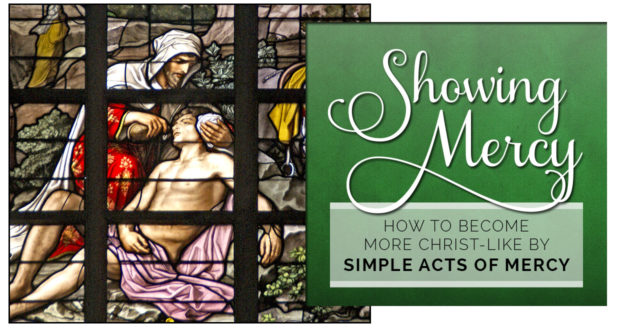We are like Christ when we show mercy.
The Good Samaritan parable gives us an example of how to show pity, or mercy, to our fellow human beings. When the Good Samaritan takes pity on the suffering man, Christ tells us to “go, and do likewise.”
I once read something which stuck with me due to its poignancy: that we are most like Christ when we show mercy. Indeed, the Incarnation itself was an act of Divine condescension to fallen humanity.
Wounds and Mercy
In Paradise Lost, Milton describes with much emotion the way in which the Son of God looked at the poor, pitiable sinners and was moved with compassion towards them. The very fact that we can be moved with compassion in our souls is a magnificent manifestation of our being made in the likeness of God. The fact that we can feel compassion and mercy towards those who have wronged us is absolutely an amazing gift from God.
Because we are able to both wound and be wounded, it is necessary to human happiness that we also be able to show mercy.
Mother Teresa writes, “When we judge others, we have no time to love them.” In similar manner, it would seem that when we judge others, we have no time to have mercy on them. We have no time to put ourselves in their shoes, and no time to pray for the grace to see the difficulties which they undergo.
In rash judgment, we immediately perceive the situation through our own pain and hurt, and proceed to rationalize the ways in which we have been treated unjustly.
If instead, we stop in this moment and pray for the Holy Spirit to intercede for us, it may be that we will come to see a broader picture of all the souls involved, rather than only our own pain.
We may then become enlightened as to a more compassionate manner of approaching our offender.
Different Paths
If each person is traveling on his or her own path to Calvary, then we can assume that they too have their share of suffering to undergo. No matter how the circumstances may appear, and whether or not they are truly in the wrong, each soul is fighting his own battle against selfishness, loneliness and sin, and because of this fact, we owe them our sympathy and our prayers.
Instead of rejoicing in our neighbor’s weakness, why are we not more sympathetic to one another when we are all in battle against the same enemy?
But it takes so much effort. It takes virtue and selflessness to put ourselves in the shoes of another. How much easier it is to hold a grudge, to refuse forgiveness for repeated offenses.
It also takes courage and prudence to broach emotional territory with another person. Whether it is my spouse, my sibling, or my friend, silence is often easier than showing pity towards the weakness of another.
Weakness exposes our vulnerabilities and our fears, and it is much more enjoyable to live life with all human insecurities conveniently masked. In this way, we will not doubt ourselves or each other, and will not need to depend on a greater power, or look towards an eternal end.
Frenemies?
Showing mercy enables us to offer forgiveness. Father Alfred Delp wrote: “There is no end to the wounds we can inflict on each other… God permits many wounds—but there are also miracles.” The very concept of extending mercy to another is an act of God, a true miracle. Learning to put another first, even in the midst of humiliation or hurt, is the beginning of the road to sanctity.
Christ calls us to this path of love, to turn the other cheek and to love our enemies. Can our “enemies” sometimes be the very people with whom we live every day?
These are the souls with whom God has placed us in closest contact, and therefore the souls whom we will most affect with either our virtue or our vice.
A good question to ask myself may be, “By withholding mercy towards another person, am I withholding the opportunity for them to ask forgiveness, and for myself to offer forgiveness?” If so, then I am denying both of us an opportunity for growth in virtue.
Indeed, we are all our brother’s keepers, and are responsible for the good of those whom we love.
Header Image CC fabiogis50

 Seton Magazine Catholic Homeschool Articles, Advice & Resources
Seton Magazine Catholic Homeschool Articles, Advice & Resources
